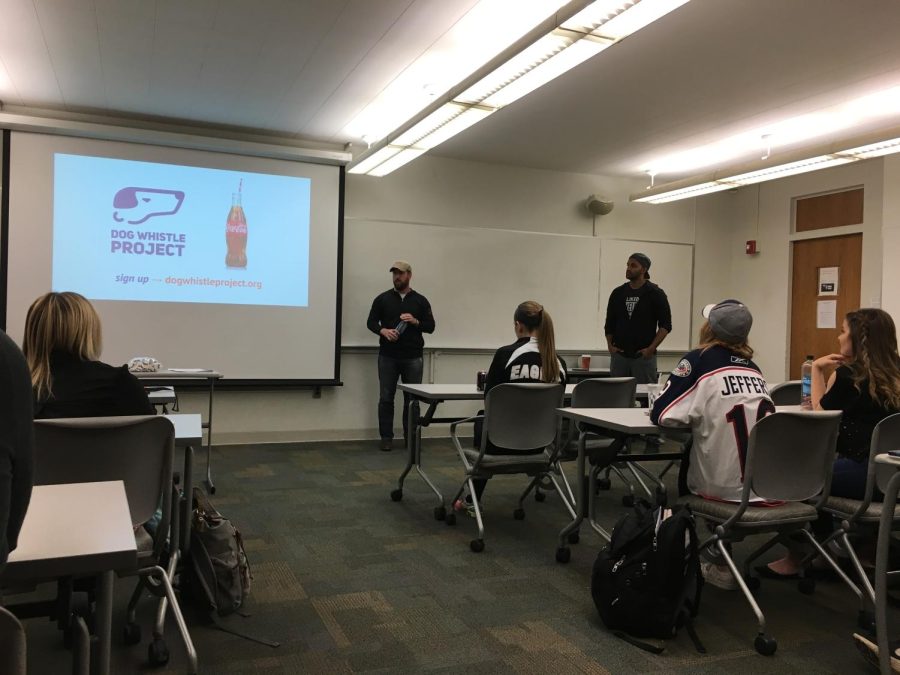Guest speakers discuss dog-whistle politics with students
Kevin Samy (right), a former Obama administration official and expert on climate change, energy, and national security policy and Chris Roessner (left), a special operations Iraq War veteran and Pallman military scholar, speak during a Kent State College Democrats meeting about their Dog Whistle Politics Project on Wednesday, April 12, 2017.
April 12, 2017
The Kent State College Democrats welcomed two guest speakers to their meeting Wednesday to discuss the growing presence of dog whistle politics in today’s political climate.
Kevin Samy, a former defensive tackle for the Miami University football team turned political campaign member, and Chris Roessner, a former member of the Armed Forces turned Hollywood screenwriter, started the Dog Whistle Project to show college students how certain topics have been used as a disguise to excuse far more sinister behavior.
For example, Roessner said that President Trump’s Muslim ban is seen as acceptable because it’s under the guise of “national security.”
According to the Dog Whistle Project website, in politics, “dog whistling” is the manipulative art of coding divisive sentiment in harmless terms.
The site reads: “We’ve all heard the phrase ‘family values’ — and we know it’s code for ‘anti-gay.’ Dog whistling corrupts language. It distorts our democracy. And we’re going to expose it and equip a new generation to fight it.”
Samy and Roessner opened their speech by playing two videos — one was the classic “I’d like to buy the world a Coke” Coca-Cola commercial from 1971 that stressed international unity and togetherness by accompaniment from a gleeful song. The other was a soundbite from the same time period from former political consultant Lee Atwater, during which he said many racist sentiments, including multiple uses of the N-word.
The two speakers said the goal for Americans should be to look like the “Coke version” of the world, not the Atwater version.
“One of the things we talked about is that ideas have been weaponized, especially due to social media,” Roessner said. “We don’t have the proper lexicon, culturally, to deal with it. We only have two words: lie and truth. In that binary world, all things are equal. So it’s important to talk about dog whistle politics because I don’t want people voting against their own interests.”
“Today, more than ever, being untruthful in politics has become very pervasive because of how easy it is to poison the well with social media,” Samy agreed. “It’s really powerful (and manipulative) … It’s something very few people seem to know about.”
Samy stressed the importance of realizing dog whistle politics as the danger to American politics no matter what the political party. They explained that in order to combat dog whistle politics, we need to think like an institutionalization, not an ideologue.
Roessner gave the example of how students could deal with their “drunk uncles at Thanksgiving” by asking them open-ended questions, and by stressing policies over feelings. He stressed that “if people can’t turn their opinions into policies, then their opinions don’t matter.”
“People are realizing when they’re being B.S.’ed,” said Anthony Erhardt, the president of the College Democrats. “People aren’t being consulted on their policy; they’re being consulted on their ideology. (It’s important to) be able to differentiate between the bullcrap and what really matters.”
Cameron Hoover is a general assignment reporter, contact him at [email protected].













